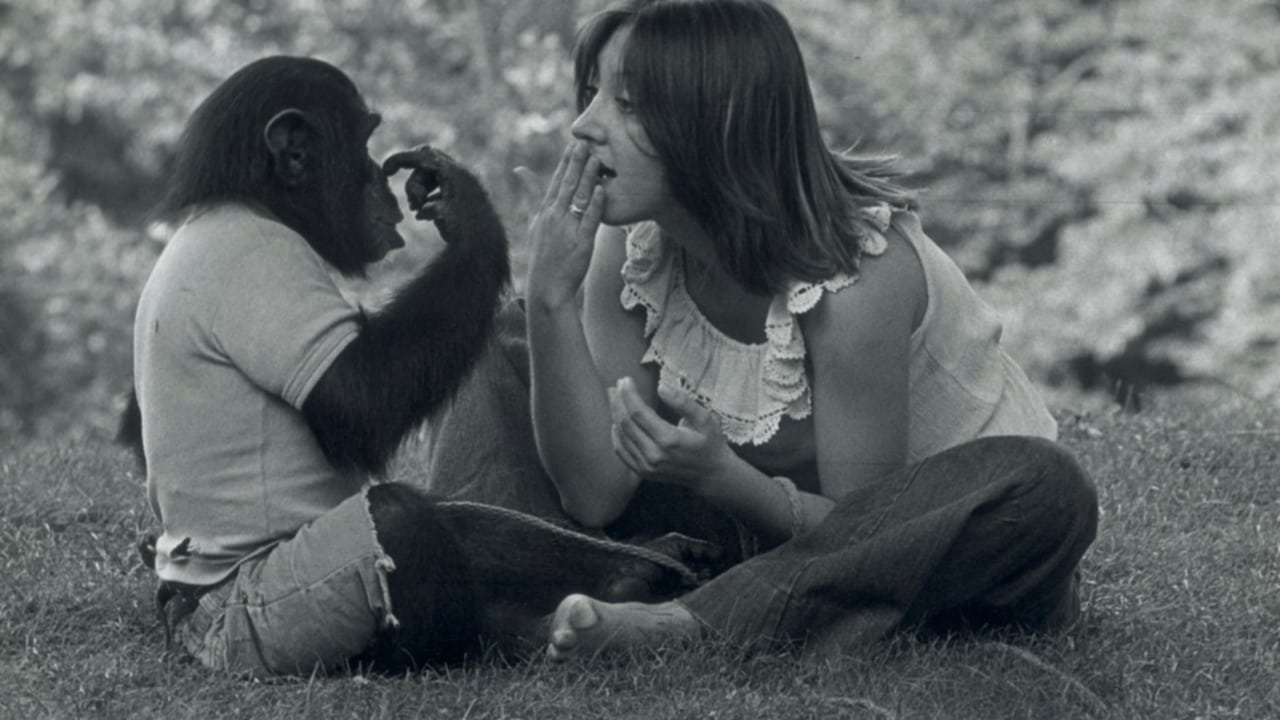

As in White Oleander, Alison Lohman's character goes through many obstactles going from foster home to foster home to institution to wherever the journey may take her character, and in a lot of ways, Nim is like Lohman's character. Nim lives a full life of ups and downs being taken away from his mother, going to one home, then another, then getting tested on for experiments, to going to a ranch. It is a rough and full life for Nim.With that full life though, there is heartache that goes out to Nim from us, the viewer, at the same time there is a special connection with Nim too, knowing he is smart, special and we can really identify with him, not only with compassion, but with empathy on a human level, as Nim goes through the gamut of what us humans go through. He goes through anger, sadness, depression, happiness, resentment, friendships, love, hate, etc. And you cry out for Nim because you've been there.When his his first human mother came back to visit him and got in the cage with him to where Nim almost killed her, it can be said that maybe Nim forgot who she was and that was just the chimp coming out in him. But who knows, maybe Nim did know who she was and hated her with much resentment for leaving him and for all the pain and suffering he's been through since then to only come back as if all was well, and he was going to show her not all was well. Who knows.I think the experiment proved that you can treat chimps just like human beings as was the case from beginning to the end of Nim's life. I think Dr. Terrace was wrong, Nim was communicating, he understood the words to what he was feeling, and that's communication. So what if Nim didn't use complete sentences. Maybe those are complete sentences to a chimp or perhaps Nim just wasn't taught correctly to use complete sentences. Chimps still have their animal and natural innate instincts as all creatures on this planet do, and that was proved as well.But the project proved true to where Nim was more than just an animal friend, he was our friend as a wonderful animal of course, but also as a sort of human being as well. He was our friend on multiple levels. Dr. Terrace got it wrong. Nim was human on many levels more than any chimp, and that's also what led to more of Nim's suffering too, being human.
... View MoreThis is the true story of what happened when a baby chimp, Nim, it taken from his mother and placed with a human family. He is taught sign language by a series of carers before becoming too big and dangerous around the age of 5 at which time he is returned to the ranch he was taken from. There is a huge amount going on in this documentary as the carers over the years are interviewed with footage from the time. What emerges will probably anger and sadden most viewers. Though I felt that Nim's carers genuinely bonded with him what emerges is a largely a tale of careless cruelty. Equally interesting and perhaps the root cause of what happens later is the relationships between the humans. Particularly between the project leader Professor Herbert Terrance and the numerous attractive research assistants. There are several references to the power he held and exercised. Overall it has to be said he does not emerge from this film as either likable or particularly competent. The various approaches of the teachers and carers differ so widely and even though there is much happy footage you have to wonder at the effect this had on Nim. I was left with the feeling that he eventually responded best to the people who recognised him as a chimp but still treated him as a companion within the limits this imposed. This is a powerful film that should be shown as widely as possible and would probably be good thing to included in school curricular.
... View MoreThe movie works really good with the new Planet of the Apes (or the Planet of the Apes movie series). It'd be a great double bill. Despite (or due to?) the fact that it is a documentary, there are quite a few similarities here, that you might find eerie. Apart from that this is a human story... sorry I mean an Ape story of course!The story that unfolds, is very engaging and might leave you with strong feelings. That is if you have a heart for animals. Though I guess if you can't stand them, than those are strong feelings too. But then you shouldn't watch it. Stay with the discovery channel or something like that. This one tells a story that is as intriguing as a feature film. I went through a few emotions until the end ... And was left with mixed feelings ... which is a good thing!
... View More¨I thought wouldn't it be exciting to communicate with a chimp and find out what it was thinking.¨ Director James Marsh won an Oscar for his brilliant documentary, Man on Wire, which told the story of French tightrope walker Phillippe Petit who performed his routine across the Twin Towers in New York City. That film was very suspenseful and really hooked my attention. Project Nim, is also directed by Marsh, but it doesn't have the same suspense that that film had. Man on Wire kept me interested in how Petit was able to achieve his goal, he was a very charismatic figure, and on the other hand Project Nim was kind of slow paced and didn't have any interesting characters rather than the Chimp himself. Nim (the name of the chimp) is fun to watch on screen, but it didn't work as a full length documentary for me. The story does raise several questions about how inhumane we can be at times and how our ¨scientific projects¨ have interfered in many animals lives. Questions which I already was familiar with, so this movie really didn't surprise me one bit, like say The Cove did with the slaughtering of the dolphins in Japan. That was a much more effective and eye-opening documentary. Project Nim is a well made documentary, but it really falls short compared to last year's great ones such as Inside Job, Restrepo, and Exit Through the Gift Shop. I haven't been able to watch many documentaries this year, but I heard this was on many critics' favorite lists so I went ahead and checked it out, but felt a bit disappointed with it. The bar has already been raised high for these movies (and Marsh himself is responsible for this after his excellent Man on Wire) so I really can't recommend this one as highly as I would've like too.Hebert Terrace was a professor at Columbia University during the 70's when he came up with the idea of trying to teach a chimpanzee how to communicate like a human being. Considering human and chimp DNA is very similar he believed that it could be possible for a chimp to communicate what he was thinking if he was raised in a normal human environment. So Terrace chose a newborn chimp, separated it from his mother, named it Nim, and gave him to a human family which would be in charge of nurturing and taking care of it as if it were a normal human being. Terrace chose Stephanie Lafarge and her family to raise the animal. It was the seventies, the hippy movement, and her family was pretty much very liberal. They had no idea of how to raise the chimp and they practically let it run around everywhere. The monkey spend the first years with that family, until Terrace decided to move him to a bigger home with more experienced professors who could teach Nim how to communicate better. Nim learned several sign languages and was taught at first by Laura-Ann Petitto, but as the chimp grew up he became more dangerous. He never lost his animals instincts although he did make some progress in communication. After five years Terrace decided to end the project as he felt the research wasn't going anywhere, and Nim was sent back to a chimp refugee where he spent most of the time locked up in cages although he felt most attached to Bob Ingersoll who continued the communication process with the animal and spent time playing with it in the wild. The documentary continues to track Nim's life until his death.The scientific project really resulted in being inhumane for the chimp because despite making some progress he never really adapted well when he was taken back with the rest of the chimps. He had been raised as a human for so long that after the project ended, Nim continued suffering the exploitations he went through. There were many people who helped Nim and really cared for him, but at the same time the entire experiment resulted in being a negative thing for the chimp. Project Nim never tries to be preachy or tell us what to do, it simply points out the facts. Marsh interviews everyone that was a part of Nim's life and shows a lot of footage that was used during the investigation. The documentary is really interesting on paper, but I really felt it dragged for some while and wasn't as entertaining as other recent documentaries. Marsh is a great director and he has great ideas, but I don't think this film really deserves an Oscar nomination. It's still a good film and if you're interested in animal behavior you might enjoy this a little more than I did. I'm more into sports and preferred the Uruguayan documentary Manyas much more, which dealt with the soccer fanatics and the way they felt for their team.http://estebueno10.blogspot.com/
... View More